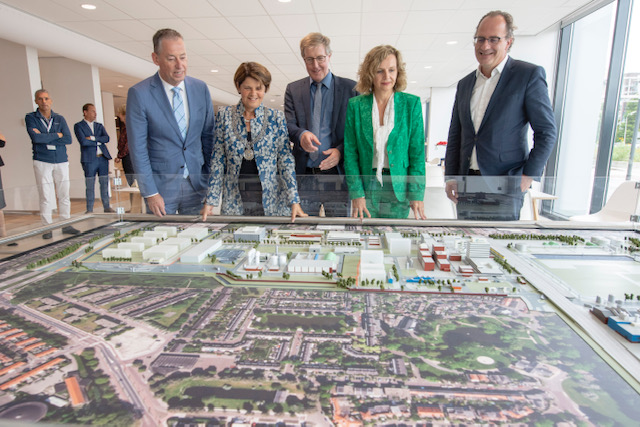Growing Biotech Campus Delft with extra jobs and companies
In order to accelerate the development of Biotech Campus Delft into a hub for open innovation in industrial biotechnology, DSM, the City of Delft, TU Delft, the Province of Zuid-Holland and InnovationQuarter have signed a letter of intent.
In the coming months, these five parties will systematically shape the cooperation around Biotech Campus Delft, as agreed by the administrators in a letter of intent signed today, the day on which Delft is celebrating the 150th anniversary of biotechnology.
The emphasis is on stimulating education, research, innovation and entrepreneurship. The Campus offers laboratories and office space for 30 new companies, creating hundreds of jobs in the coming years.
‘It is our ambition to develop Biotech Campus Delft into an ecosystem of international significance,' said Edith Schippers, president of DSM Netherlands: ‘Climate change, healthy food for the rapidly growing world population and scarcity of raw materials are a number of major social problems that we can solve through the application of biotechnology. DSM and TU Delft have a wealth of biotechnological knowledge and the Campus has all the facilities, from labs to a pilot plant. There is room for new companies, from start-ups and SMEs to large companies and knowledge institutes. Everyone can research, develop, test and scale up here. Cooperation is crucial if we want to become the biotechnological hub of the world. The problems are big and therefore our ambition is big. This is why DSM, the City of Delft, TU Delft, the Province of Zuid-Holland and InnovationQuarter are working to accelerate the development of Biotech Campus in Delft'.
Marja van Bijsterveldt, mayor of Delft, explains enthusiastically: ‘Delft is the birthplace of industrial biotechnology. For 150 years, groundbreaking biotechnological research has been carried out at DSM and TU Delft, and technical inventions have been successfully commercialised. Biotech Campus Delft is a place where scientific knowledge and skills are converted into knowledge-intensive businesses, and where innovation and employment are stimulated. The development of Biotech Campus Delft will lead to growth in both direct and indirect employment in our city'.
‘We are proud of the world-leading position that TU Delft has had in biotechnology for many years', says Tim van der Hagen, Rector Magnificus and President of TU Delft. For us, it is about impact for a better society: in addition to providing a place for excellent education and research, we also want new technology that emerges here to benefit society in the form of innovative applications and products. With Biotech Campus Delft, we are expanding the ecosystem around TU Delft with high-quality industrial testing facilities, with an ideal environment in which our start-ups can grow and with space to work with companies that share our mission'.
Biotech Campus Delft is also important for the province of Zuid-Holland. Adri Bom-Lemstra, member of the Zuid-Holland Provincial Executive: Zuid-Holland is the engine of the Dutch economy and has the potential to be a unique initiator of sustainability, prosperity and well-being in the Netherlands and Europe. We have a strong and diverse innovation ecosystem: powerful clusters, leading knowledge institutions, infrastructure and entrepreneurship. Delft is adding a biotechnology sector that has tremendous social and economic potential in the transition to a sustainable society.’
Rinke Zonneveld, director of InnovationQuarter, the regional development company of Zuid-Holland, added: ‘The Zuid-Holland region wants to become one of the first fully circular regions in the world. Industrial ecosystems are important building blocks in the transition to a circular economy. We support promising biotechnology companies that want to establish themselves on Biotech Campus Delft, so that the Campus can fully develop its important role as a breeding ground for the development and application of sustainable food, chemistry and fuels.’
